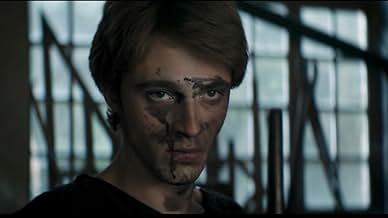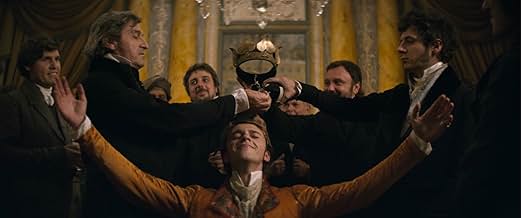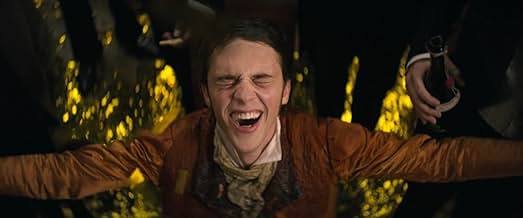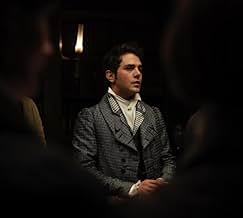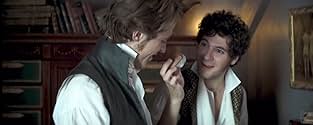Illusions perdues
- 2021
- Tous publics
- 2h 29min
NOTE IMDb
7,4/10
7,2 k
MA NOTE
Une adaptation du roman d'Honoré de Balzac "Illusions perdues".Une adaptation du roman d'Honoré de Balzac "Illusions perdues".Une adaptation du roman d'Honoré de Balzac "Illusions perdues".
- Réalisation
- Scénario
- Casting principal
- Récompenses
- 9 victoires et 23 nominations au total
Avis à la une
After a long hiatus since the pandemic, I made a return to the cinema notably to catch up with #lefrenchfilmfestival. Most of the films I would say struggled to justify your time in the cinema indulging in such frivolity but this one particularly stood out.
I am not familiar with and have never read Balzac but I reckon this film gives you a glimpse of his genius and why he remains a giant in French literary circle, not merely for prose or poetry but for his devastatingly incisive social commentary still relevant today.
And one couldn't help but feel despite our technological advancements and having totally plundered the planet, from a moral standpoint the world hasn't progressed not even an inch today and remains mercilessly mercenary under a veneer of righteousness as Balzac had so accurately depicted some two centuries ago.
Dazzlingly executed with a superb ensemble of cast, illuminating performances, a production nothing short of breathtaking and lashings of Baroque including the less often heard Jean-Philippe Rameau, the film remains and stays with you long after you have left the cinema.
I am not familiar with and have never read Balzac but I reckon this film gives you a glimpse of his genius and why he remains a giant in French literary circle, not merely for prose or poetry but for his devastatingly incisive social commentary still relevant today.
And one couldn't help but feel despite our technological advancements and having totally plundered the planet, from a moral standpoint the world hasn't progressed not even an inch today and remains mercilessly mercenary under a veneer of righteousness as Balzac had so accurately depicted some two centuries ago.
Dazzlingly executed with a superb ensemble of cast, illuminating performances, a production nothing short of breathtaking and lashings of Baroque including the less often heard Jean-Philippe Rameau, the film remains and stays with you long after you have left the cinema.
It's very rare to be able to watch a 2h long literature movie without getting bored at any point.
Great cast, great adaptation of dialogues that make it a modern adaptation of Balzac while still translating the soul of it.
Great cast, great adaptation of dialogues that make it a modern adaptation of Balzac while still translating the soul of it.
I started to read "Lost Illusions" once and didn't get very far. Not that I thought it was bad, but rather that I just wasn't in the mood for Balzac's style of writing just then. I'll probably revisit it some day.
So I can't speak to how good an adaptation this movie is, but man is it a good movie in its own right. I love stories about women in big dresses and men in cravats exchanging significant glances in drawing rooms, which is pretty much all this movie is. The young actor Benjamin Voisin carries this movie admirably on his slim shoulders, and the whole thing is a scathing indictment of the relationship between journalism, wealth, and power. It's eye opening, not necessarily because it's surprising, but because it makes Paris of the 1800s relevant to the world of 2023.
And I don't think I've ever seen a more effective and artistic closeup of male genitalia in a film before. The juxtaposition of a fistful of money against a male penis says in a single image what Balzac spent pages and pages communicating to his readers.
Grade: A.
So I can't speak to how good an adaptation this movie is, but man is it a good movie in its own right. I love stories about women in big dresses and men in cravats exchanging significant glances in drawing rooms, which is pretty much all this movie is. The young actor Benjamin Voisin carries this movie admirably on his slim shoulders, and the whole thing is a scathing indictment of the relationship between journalism, wealth, and power. It's eye opening, not necessarily because it's surprising, but because it makes Paris of the 1800s relevant to the world of 2023.
And I don't think I've ever seen a more effective and artistic closeup of male genitalia in a film before. The juxtaposition of a fistful of money against a male penis says in a single image what Balzac spent pages and pages communicating to his readers.
Grade: A.
Lost illusions is for many critics, the best Balzac's novel and the adaptation that Xavier Giannoli (the director) delivers is not only fairly pleasant, dynamic and very well interpreted, it also has a special resonance in our world controled by social networks, search for buzz, influencers, fake news and a few rich media owners.
However, the story seems quite far from our world as it takes place in the first part of the 19th century (around 1820-1830) during the period of "Restauration", when monarchy came back to power in France but also when the liberals were pushing for changing the regime or at least experimenting new liberties such as parliamentarism and freedom of the press.
Lucien de Rubempré is this young man full of dreams who comes from the French country side eager to live from his literary talents, driven by his forbidden love to a rich aristocrat . Sent away to Paris, little by little Lucien will lose his illusions to discover a world full of greed, machiavellianism and dishonesty.
Xavier Giannoli tackles lots of topics in what we understand is a very rich novel. One of the topic is the transformation of literature into merchandise. The depiction of the book publishers is machiavellian. The depiction of a new kind of journalism based on sensacional news is quite shocking. In fact, Xavier Giannoli doesn't make a plea for journalists, on the contrary, he even tries to discredit them and presents them as filthy people, greedy for money. It's sometimes a little bit too much but we understand that the new liberties conceded by the government back in those days have a repercussion on different fields of the society and we also understand it concerns a certain type of journalism and not all journalisms. However the resonence in our 21st century world is quite obvious concerning the search of buzz.
We clearly understand that what the director wants to make us some winks thoughout his film, winks that the attentive spectator cannot miss. There is notably the explanation of how the buzz is created among the press, but also how the media (for the time, mainly newspapers) are controlled and owned by rich entrepreneurs or by the big bosses of advertising agencies and how these influencers of the 19th century try to invade the parliament and get the hold of the main positions among the government. The sentence "there will be a time a bankier will be president of the republic" is clearly a wink to our French president Macron, former banker himself.
All in all, Xavier Giannoli makes a great adaptation, with a lot of characters and a fine depiction and understanding of the changes that were at stake back in the 19th century and that have a special resonance nowadays.
However, the story seems quite far from our world as it takes place in the first part of the 19th century (around 1820-1830) during the period of "Restauration", when monarchy came back to power in France but also when the liberals were pushing for changing the regime or at least experimenting new liberties such as parliamentarism and freedom of the press.
Lucien de Rubempré is this young man full of dreams who comes from the French country side eager to live from his literary talents, driven by his forbidden love to a rich aristocrat . Sent away to Paris, little by little Lucien will lose his illusions to discover a world full of greed, machiavellianism and dishonesty.
Xavier Giannoli tackles lots of topics in what we understand is a very rich novel. One of the topic is the transformation of literature into merchandise. The depiction of the book publishers is machiavellian. The depiction of a new kind of journalism based on sensacional news is quite shocking. In fact, Xavier Giannoli doesn't make a plea for journalists, on the contrary, he even tries to discredit them and presents them as filthy people, greedy for money. It's sometimes a little bit too much but we understand that the new liberties conceded by the government back in those days have a repercussion on different fields of the society and we also understand it concerns a certain type of journalism and not all journalisms. However the resonence in our 21st century world is quite obvious concerning the search of buzz.
We clearly understand that what the director wants to make us some winks thoughout his film, winks that the attentive spectator cannot miss. There is notably the explanation of how the buzz is created among the press, but also how the media (for the time, mainly newspapers) are controlled and owned by rich entrepreneurs or by the big bosses of advertising agencies and how these influencers of the 19th century try to invade the parliament and get the hold of the main positions among the government. The sentence "there will be a time a bankier will be president of the republic" is clearly a wink to our French president Macron, former banker himself.
All in all, Xavier Giannoli makes a great adaptation, with a lot of characters and a fine depiction and understanding of the changes that were at stake back in the 19th century and that have a special resonance nowadays.
I won't repeat the storyline here as that's already been covered by many others. Lost Illusions is a visually sumptuous film throughout. I did notice that all of the camera work is quite tight, with very few if any longshots. As such it can feel slightly claustrophobic, if by design or chance I'm not sure. I'm not suggesting it a positive or negative, just an observation. I generally liked the male performances, especially Voisin does a nice job. Salome Dewaels does a very fine job as well but I feel the two other female performances were both a bit constrained. Several viewers took issue with the volume of narration - to that I feel there might have been a couple of instances of this, ever so slightly, but for the most part I have no major issues with this element. Lost Illusions is a beautiful and interesting film worth checking out.
Le saviez-vous
- AnecdotesThe character of Nathan d'Anastazio, played by Xavier Dolan, is actually a synthesis of three characters from the novel: Raoul Nathan, a scheming journalist, Daniel d'Arthez, a hard-working writer and Melchior de Canalis, a successful poet.
- GaffesThe Dejazet theater is mentioned, but the movie takes place in the early 1800s, during the Restoration, and this theater was inaugurated on September 27th, 1859.
- Bandes originalesConcerto in A Minor, BWV 1065: I. Allegro
Composed by Johann Sebastian Bach
Performed by Ensemble Bruno Rigutto, Gabriel Tacchino, Jean-Philippe Collard, Jean-Pierre Wallez, Michel Beroff & Paris Orchestral
Meilleurs choix
Connectez-vous pour évaluer et suivre la liste de favoris afin de recevoir des recommandations personnalisées
- How long is Lost Illusions?Alimenté par Alexa
Détails
- Date de sortie
- Pays d’origine
- Site officiel
- Langue
- Aussi connu sous le nom de
- Comédie humaine
- Lieux de tournage
- Sociétés de production
- Voir plus de crédits d'entreprise sur IMDbPro
Box-office
- Budget
- 18 700 000 € (estimé)
- Montant brut aux États-Unis et au Canada
- 126 391 $US
- Week-end de sortie aux États-Unis et au Canada
- 15 182 $US
- 12 juin 2022
- Montant brut mondial
- 8 635 184 $US
- Durée2 heures 29 minutes
- Couleur
- Rapport de forme
- 2.41 : 1
Contribuer à cette page
Suggérer une modification ou ajouter du contenu manquant





